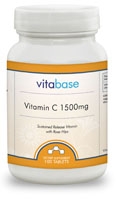| Vitamin C (ascorbic acid), a reducing agent, is necessary to maintain the enzyme prolyl hydroxylase in an active form, most likely by keeping its iron atom in a reduced state. Vitamin C is an essential nutrient for humans. Vitamin C is an important antioxidant vitamin involved in the development of connective tissues, lipid and vitamin metabolism, biosynthesis of neurotransmitters,
immune function, and wound healing. It is found in fruits, especially citrus fruits like oranges, lemons, and grapefruit, and in green leafy vegetables like broccoli and spinach.
Vitamin C deficiency results in an underhydroxylation of proline and lysine in collagen which results in a lower melting temperature of the resulting collagen fibers which causes a breakdown of the protein collagen needed for connective tissue, bones and dentin, the major portion of teeth. Pregnancy, breastfeeding, gastrointestinal diseases, and hyperthyroidism increase the need for vitamin C. Inflammatory diseases, burns, and surgery can also increase a person's need for vitamin C. Collagen is a cementing material that binds cells together, and is an essential connective tissue protein in the body. Whenever the body is wounded, collagen glues the separated tissues together to form a scar. A lack of collagen causes the walls of the body's blood capillaries to break down and hemorrhaging occurs in cells throughout the body. When capillaries lose the "glue" that holds them together, symptoms of scurvy appear.
Vitamin C deficiency can lead to dry and splitting hair; gingivitis (inflammation of the gums) and bleeding gums; rough, dry, scaly skin; decreased wound-healing rate, easy bruising; nosebleeds; weakened enamel of the teeth; swollen and painful joints; anemia; decreased ability to ward off infection; and, possibly, weight gain because of slowed metabolic rate and energy expenditure. A severe form of vitamin C deficiency is known as scurvy, which mainly affects older, malnourished adults.
A lack of vitamin C leads eventually to scurvy. Scurvy is a condition caused by a lack of vitamin C (ascorbic acid) in the diet. Signs of scurvy include tiredness, muscle weakness, joint and muscle aches, a rash on the legs, and bleeding gums. The symptoms are mainly due to poorly formed collagen and include the breaking open of small blood vessels, the reddening and bleeding of gums, loose teeth, joint pains, dry scaly skin and blood vessel damage. Other symptoms include general weakness, fluid retention, depression, and anemia. Other vitamin C deficiency symptoms include general weakness, fluid retention, depression and anemia. Vitamin C deficiency can also cause slower wound-healing, increased susceptibility to infections, male infertility and increased genetic damage to sperm cells, which may lead to birth defects.
Symptoms of scurvy include inflamed and bleeding gums, petechiae, ecchymosis, follicular hyperkeratosis, coiled hairs, perifollicular hemorrhages, impaired wound healing, dry eyes and mouth (Sjögren's syndrome), arthralgia, joint effusions, muscle weakness, myalgia, fatigue, depression, frequent infections, anemia, anorexia, diarrhea, and pulmonary and kidney problems that can lead to coma and death. Basically, scurvy affects all systems of the body. A vitamin C deficiency can also result in anemia, in which there is a decrease in red blood cells, total amount of blood, or an iron containing substance in the blood called hemoglobin. If the vitamin C deficiency were severe enough, it would result in a disease called scurvy, which is characterized by tiredness, swelling, loosening of the teeth, hardening of leg muscles, and other unpleasant symptoms. |
